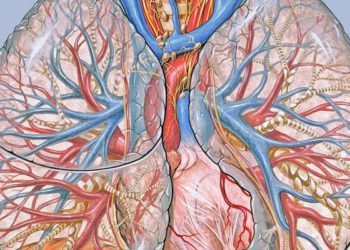CFTR modulation therapy improves predicted FEV1 in patients with heterozygote residual function cystic fibrosis
1. Absolute change in predicted forced expiratory volume in 1 second (FEV1) improved significantly over a 4 and 8-week period among patients assigned tezacaftor-ivacaftor therapy or ivacaftor compared to placebo.
2. Those randomized to the tezacaftor-ivacaftor or ivacaftor treatment groups exhibited significant improvement in cystic fibrosis questionnaire-revised (CFQ-R) respiratory domain score, a quality of life measure for cystic fibrosis patients.
Evidence Rating Level: 1 (Excellent)
Study Rundown: Cystic fibrosis (CF) is a multisystem condition characterized by variant mutations in the cystic fibrosis transmembrane conductance regulator (CFTR) gene, causing impaired chloride ion transport across cell membranes. Various CFTR mutations exhibit residual CFTR function, allowing for pharmaceutical augmentation of these proteins. Ivacaftor improves CFTR channel opening at the cell surface, and tezacaftor improves CFTR protein trafficking to the cell surface. Used together, these treatments have been hypothesized to improve respiratory function in patients with CF.
This phase 3 randomized clinical trial included patients with heterogeneous CFTR mutations and randomized them to receive tezacaftor-ivacaftor, ivacaftor monotherapy, or placebo for 8 weeks. The primary endpoint was to assess any changes in FEV1 respiratory function from baseline compared to 4 and 8 weeks post-intervention. Patients on tezacaftor-ivacaftor or ivacaftor therapy exhibited significant improvement in predicted FEV1 compared to placebo when assessed at 4 and 8 weeks post-treatment. This study indicates that patients who have CF with residual function CFTR mutations may clinically benefit from therapies that involve tezacaftor-ivacaftor or ivacaftor alone.
Click to read the study, published in NEJM
Relevant Reading: Tezacaftor-ivacaftor in patients with cystic fibrosis homozygous for Phe508del
In-Depth [randomized control trial]: This phase 3 randomized, placebo-controlled crossover trial enrolled 248 patients between 2015 and 2017. Eligible patients were 12 years old or older with heterozygous CFTR mutations (one Phe508 deletion and one residual function mutation) randomized to receive two of three potential treatment regimens: tezacaftor-ivacaftor dual therapy (n = 83), ivacaftor monotherapy (n = 81), or placebo (n = 80) through two 8-week intervention periods separated by an 8-week washout period. The primary endpoint of this study was level of absolute change in the percentage of predicted FEV1 from baseline to 4 and 8 weeks post-intervention between each of the three arms. The key secondary endpoint of this study was the absolute change in CFQ-R respiratory domain score from baseline to 4 and 8 weeks post-intervention.
The mean difference in predicted FEV1 of tezacaftor-ivacaftor compared to placebo was 6.8 percentage points (95%CI, 5.7 to 7.8; p < 0.001) and 4.7 percentage points (95%CI, 3.7 to 5.8; p < 0.001) for ivacaftor compared to placebo. Comparing the treatment groups, the change in predicted FEV1 was greater in the tezacaftor-ivacaftor group compared to the ivacaftor group (mean difference 2.1; 95%CI, 1.2 to 2.9; p < 0.001). CFQ-R respiratory domain scores were higher in the treatment groups compared to placebo by 11.1 points (95%CI, 8.7 to 13.6; p < 0.001) in the tezacaftor-ivacaftor group and 9.7 points (95%CI, 7.2 to 12.2; p < 0.001) for ivacaftor alone. Improvements in secondary endpoints in the active treatment arms compared to placebo included lower sweat chloride concentrations among participants in either treatment arm compared to placebo. Adverse events related to the trial regimen occurred at similar rates in all three groups. Collectively, these results suggest a potential role for tezacaftor-ivacaftor and ivacaftor therapy for patients with CF.
Image: CC/Wiki
©2017 2 Minute Medicine, Inc. All rights reserved. No works may be reproduced without expressed written consent from 2 Minute Medicine, Inc. Inquire about licensing here. No article should be construed as medical advice and is not intended as such by the authors or by 2 Minute Medicine, Inc.







